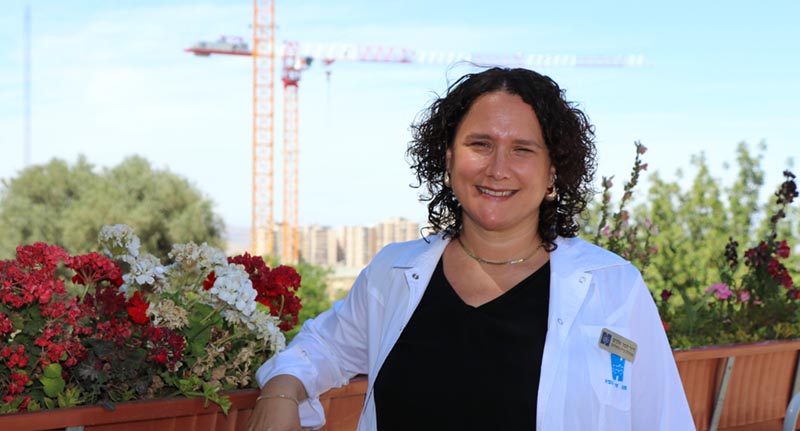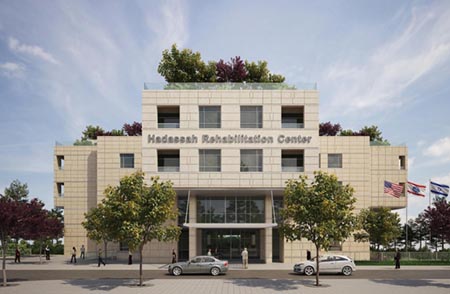Health + Medicine
Spearheading an Expansion on Mount Scopus

Dr. Tamar Elram is with a patient in the community health center in Ma’ale Adumim, a city in the Judean Hills, when a nurse urgently summons her for another case. A pregnant woman at the center no longer feels her baby moving, and the fetal monitor shows reason for concern. The closest operating room is 20 minutes away; Dr. Elram, an obstetrician-gynecologist, calls an ambulance. When the ambulance is a no-show, she leads the distressed woman to her own car, fastens to its roof the emergency police light she carries as CEO of Hadassah Hospital Mount Scopus and speeds, literally, to Jerusalem, alerting the hospital’s delivery team en route.
A little boy is born soon after arrival at Mount Scopus. He needs help breathing in his first few days, and then settles into normal, healthy growth.
Dr. Elram, 50, has been head of the 350-bed Mount Scopus hospital since 2017, responsible for its staff of 1,200 and almost 300,000 patients each year as well as for its operations, maintenance and development. But she still relishes her clinical work. “Continuing to practice gynecology keeps my feet on the ground,” she said, “and my eyes at patient level.”
Whether serving individuals or an institution, “you impact people in every encounter and must therefore always exercise your responsibility and authority in the best way,” she said. Treating patients, she added, “is a privilege to be cherished, and so is leading Hadassah Mount Scopus—especially now, as it embarks on a massive expansion.”
This expansion is the response of Hadassah, the Women’s Zionist Organization of America and the Hadassah Medical Organization to the medical needs of Jerusalem, which is among the country’s fastest-growing urban regions and has the highest proportion of elderly residents in Israel. Among the additions planned for the 86-year-old hospital campus are seven new buildings that “will change the skyline to the northeast of the city,” said Dr. Elram, including a new rehabilitation center slated to open in 2023.
Almost five years ago, Dr. Elram came to Mount Scopus after directing another Jerusalem hospital, Misgav Ladach. Originally from England, her family moved to Jerusalem when she was 5 years old. By the time of her bat mitzvah, she had decided on a medical career and ultimately attended the Hadassah-Hebrew University School of Medicine.
She has two master’s degrees. The first, earned through a prestigious Wexner Israel Graduate Fellowship she received from the Wexner Foundation, which supports the development of Jewish leaders in North America and Israel, is in public administration from Harvard University. The second, in health administration, is from Hebrew University.
She has served as assistant to Israel’s Health Ministry director-general and as the deputy director of Hadassah Hospital Ein Kerem. Dr. Elram lives in Alon, near Ma’ale Adumin, and she and her husband, Daniel, have five children, aged 13 to 24. In addition to directing a busy hospital, leading its expansion and spending time with her family, Dr. Elram is a poet who writes about women, motherhood and medicine. A Doctor’s Handwriting: Poems, a collection of her work, was published by Niv Books last year.
“I love taking on challenges, creating work procedures, pushing forward building projects and addressing organizational culture,” she said.
Among those challenges is figuring out how best to lead—in ordinary times, in times of stress, such as the pandemic, as well as during transitions—a subject she has thought long and hard about.
“I believe in awareness-based leadership, an approach in which the leader’s culture is about ‘we’ rather than ‘me,’ ” she said, explaining that this method focuses on identifying principles and living by them as well as recognizing the feelings and values of those who work with her.
On the shelves in her Mount Scopus office are books that have influenced her: Dvora Hacohen’s new, award-winning biography of Henrietta Szold, To Repair a Broken World; a volume of yoga philosophy; and Alan Morinis’s Everyday Holiness: The Jewish Spiritual Path of Mussar.
“Henrietta Szold exemplifies a successful value-driven leader,” said Dr. Elram. “Yoga gave me the principle of ahimsa, or non-aggression, in negotiating at every level.” Morinis’s book explores topics such as humility, compassion, generosity, responsibility and faith—values to which she “connected instantly,” both as an individual and as a CEO.
Dr. Elram’s leadership approach quickly proved itself. “Tamar is an energetic and dedicated manager, doing a wonderful job,” said Dalia Itzik, former speaker of the Knesset and chair of HMO in Israel.
For her part, Dr. Elram attributes much of the success of the hospital to her staff and teamwork. “Things work, medically, administratively, planning-wise because the team functions brilliantly, embraces appropriate values and makes what we do easy,” she said.
In the years since Dr. Elram took the reins, the hospital has totally renovated its emergency center and opened its first trauma unit. The number of births at Mount Scopus has increased by over 30 percent thanks to a renovated and expanded delivery department, part of the new Rady Mother and Child Center. And, with financial support from the United States Agency for International Development, the hospital has opened Hadassah’s first cardiac rehabilitation unit and completed northern Jerusalem’s first cardiac catheterization laboratory, where 1,000 procedures are performed each year.
The changes in maternity and cardiac care are just the beginning. Today, there are cranes and construction workers on the hospital’s 28-acre campus, finishing the eight-story, $100-million-plus Gandel Rehabilitation Center, named a “priority strategic project” by the Israeli government. Replacing Hadassah Mount Scopus’s modest 50-year-old rehabilitation facility, which crowded four to five patients per room, the Gandel center is scheduled to open early next year with cutting-edge research and rehabilitation facilities, including hydro-, physio- and occupational therapies as well as clinics, outpatient areas and a healing garden on its roof.

Four inpatient wings, with a total of 132 beds (in contrast to the current 38) are also being planned for the new center, with treatment areas including rehabilitation for neurological, orthopedic, spinal cord injury, geriatric and ventilator-dependent cases.
“Hadassah’s is the only rehab facility for greater Jerusalem’s 1.2 million-plus residents, and currently it’s able to cope with just 30 percent of the need,” explained Dr. Elram. “The Gandel center will be the country’s largest. Without exaggeration, it’s among the most important projects underway in Israel today.” The center is a flagship project of Hadassah International and Hadassah Australia, which recently received one of Hadassah’s largest ever single donations, given by the Gandel Foundation, led by John and Pauline Gandel of Melbourne, Australia.
The Gandel center is the first of the new construction projects planned for Hadassah Mount Scopus, the older of Hadassah’s two Jerusalem campuses. In the coming decades, six more buildings are slated to join the center, among them a 14-story inpatient tower and a new emergency center. The original 1930s building—when it opened, considered among the most modern hospital buildings in the Middle East—will be conserved, its use yet to be determined. Also planned is an electric power generation station, a helipad, a hotel for patient families and a commercial area near the Mount Scopus light rail station.
For spearheading these changes at Mount Scopus as well as for her extensive clinical work, Dr. Elram is frequently recognized as a leader in her field. In 2019, Lady Globes magazine included her as one of the “50 Most Influential Women in Key Positions in Israel,” citing her leadership abilities and the transformations at Mount Scopus. And in 2021, the national religious women’s organization, Emunah, named Dr. Elram, herself observant, Woman of the Year.
Dr. Elram is proud of the recognition but is nevertheless frustrated when selected for gender-focused lists and awards. “The split is chauvinist,” she said. “There should be no such division. We’re all human beings.”
What we should focus on, she added, is where we can “do the most good.”
The Physician-Poet, Selections From A Doctor’s Handwriting
ASPIRATION
I am driven
To seek out the Spirit;
I will go to her Up to the high Himalayan peaks.
There she will await me
As an ancient Buddhist monk
Whom I will quietly sit beside, eastern pose
I have been breathless….
OPPORTUNITIES
Did you know
That most excavations are covered up again?
It’s no surprise: we’ve been trained
To hew, with tiny hammers and chisels,
Into souls we have encountered our way.
Youthful encounters at night, on the sidewalk,
In a counseling in Kfar Saba,
In the moist air of the eighties.
Wendy Elliman is a British-born science writer who has lived in Israel for more than four decades.








 Facebook
Facebook Instagram
Instagram Twitter
Twitter
[…] This is an excerpt from an article by Wendy Elliman, first published in Hadassah Magazine. […]